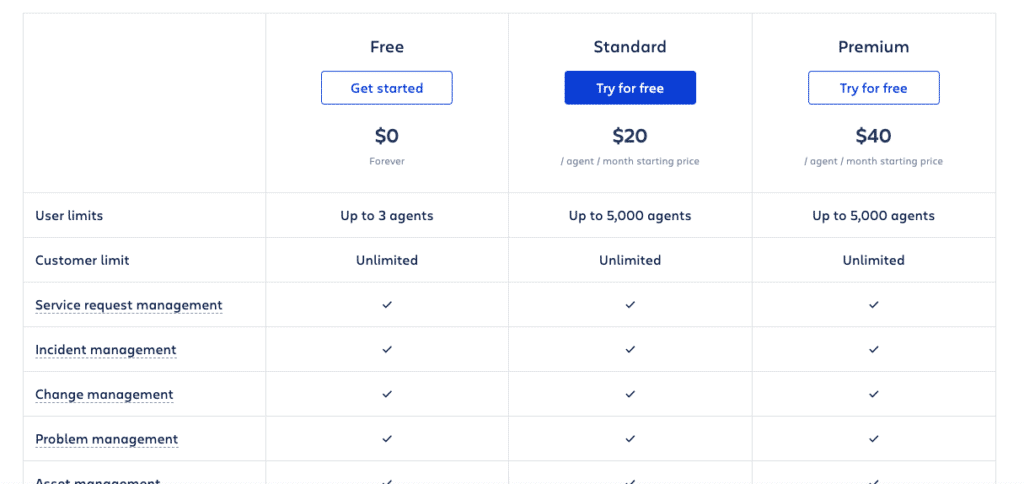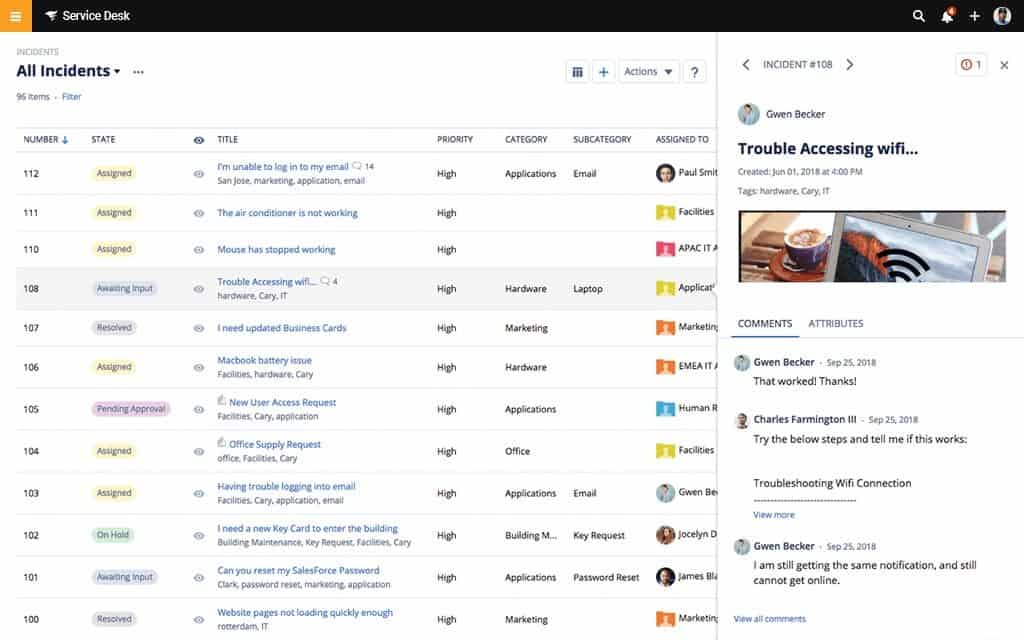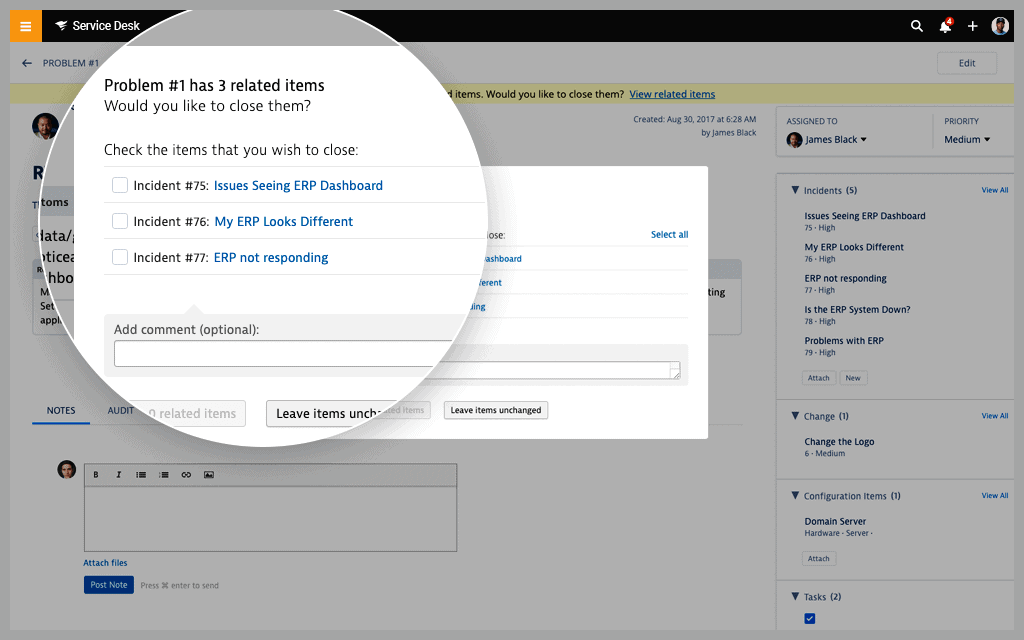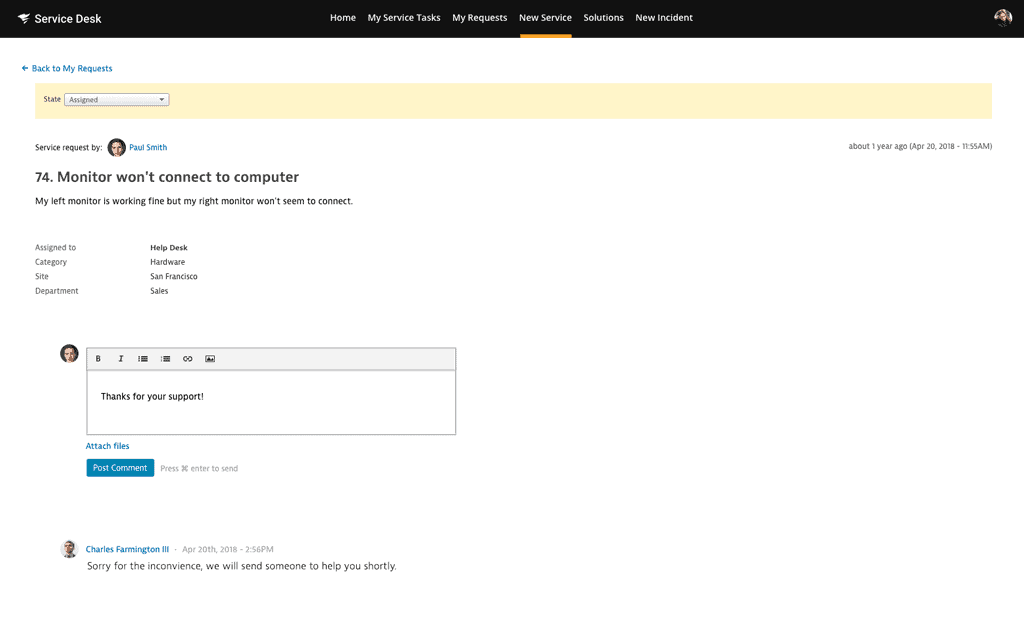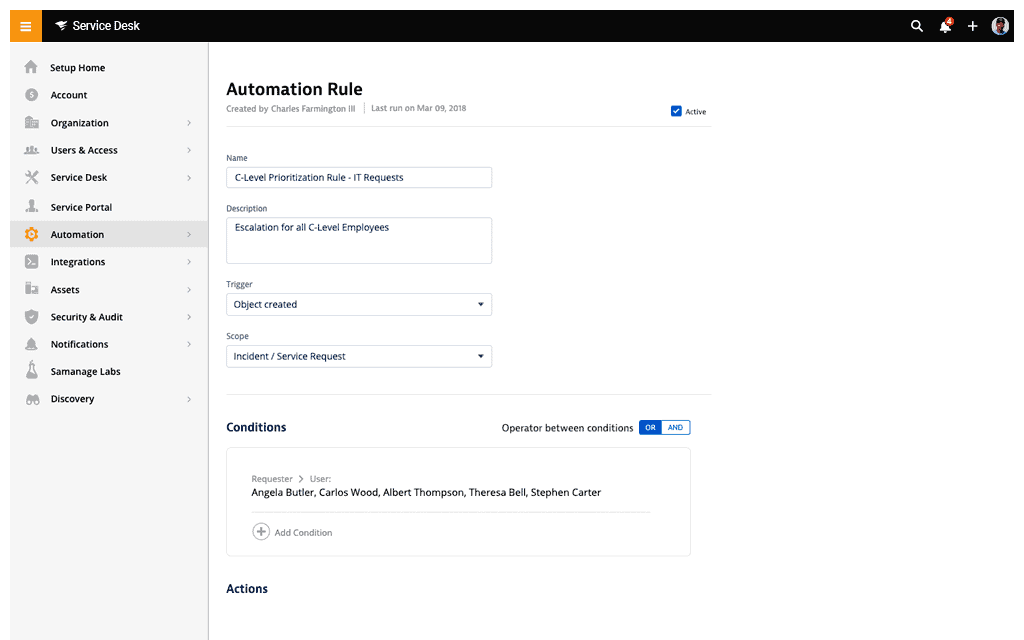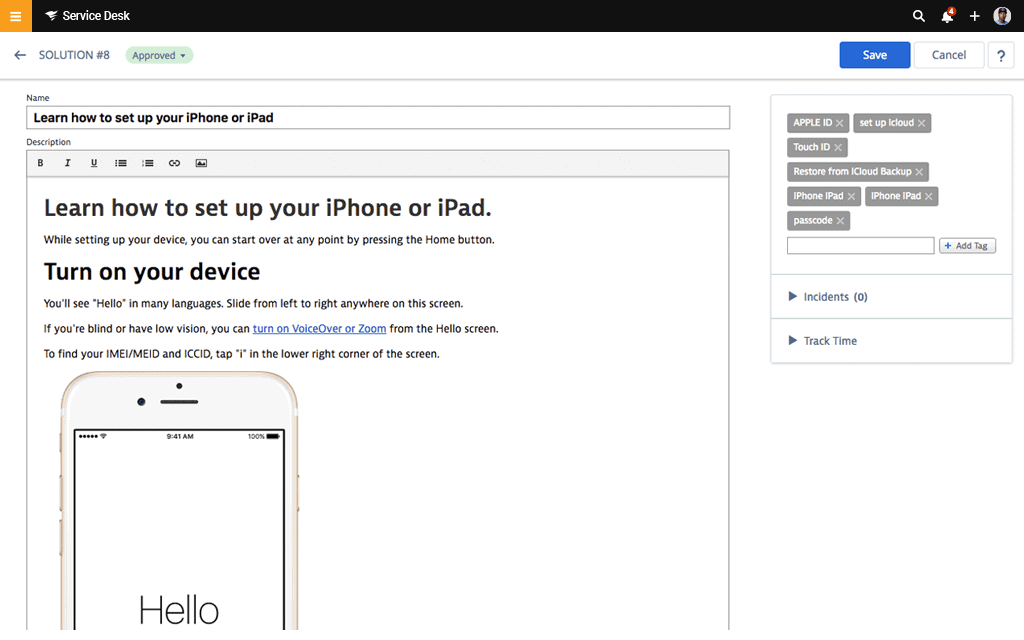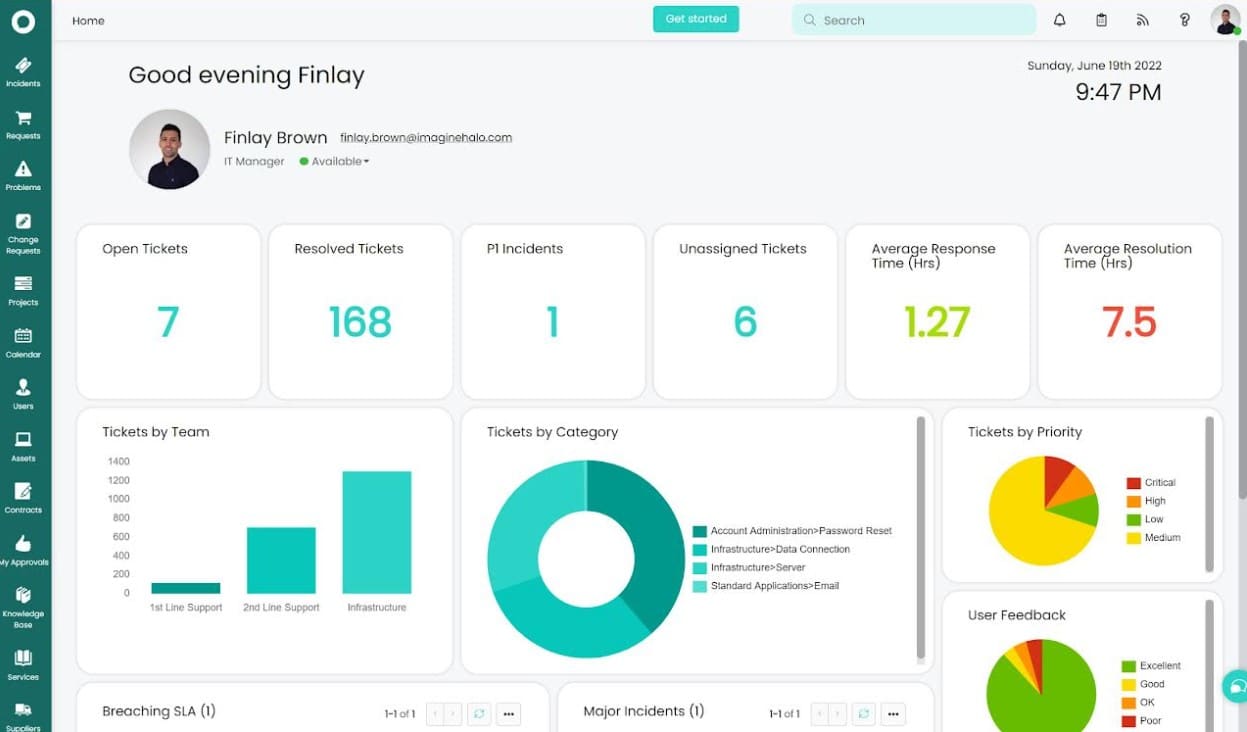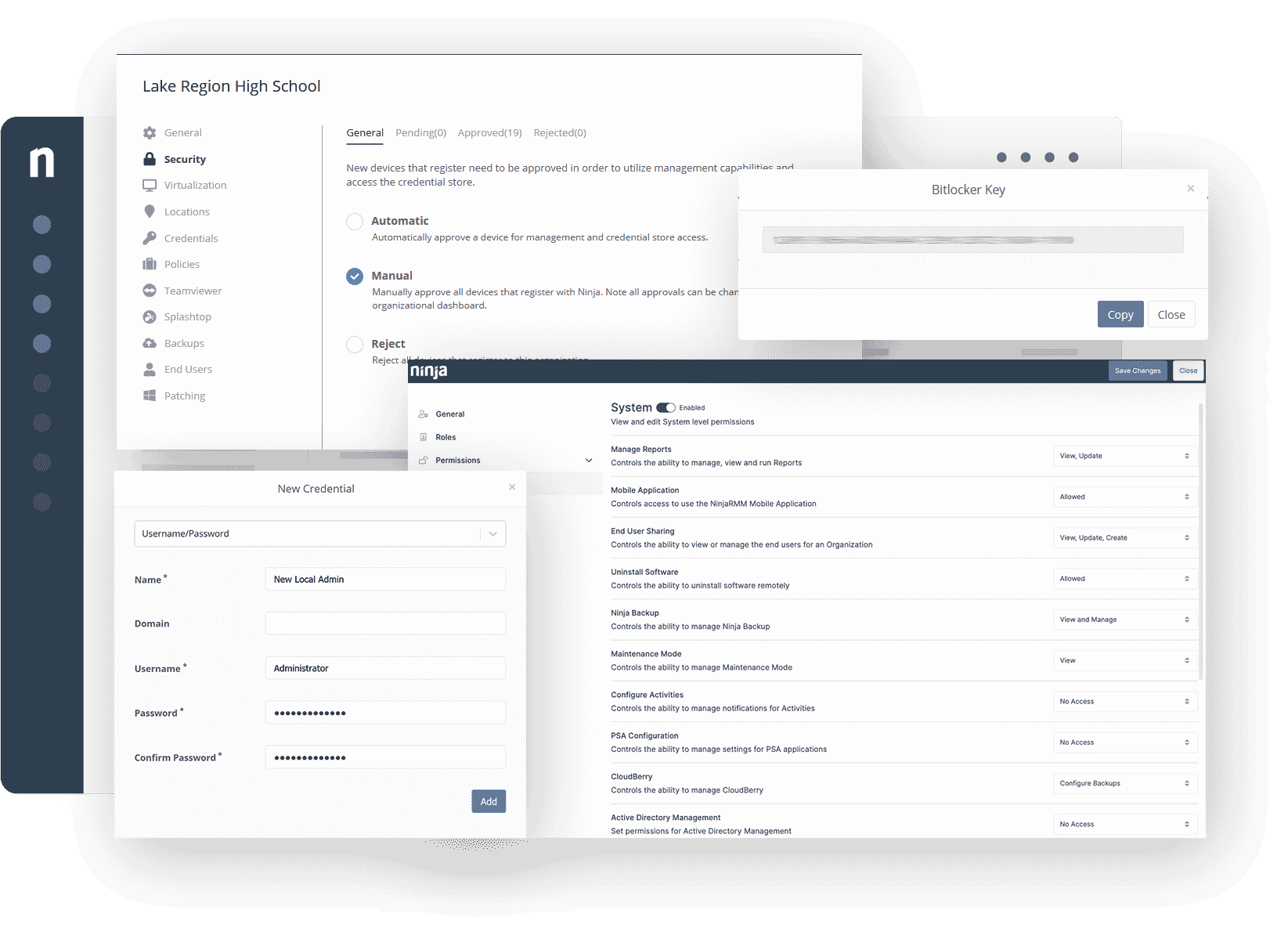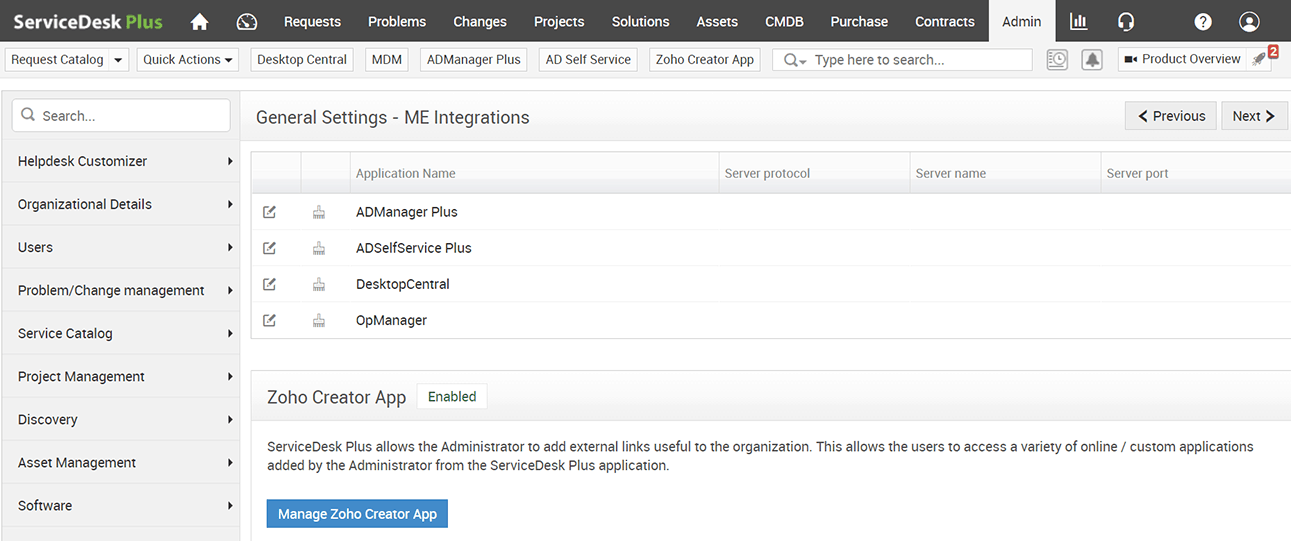Our funding comes from our readers, and we may earn a commission if you make a purchase through the links on our website.
JIRA Service Desk Review & Alternatives
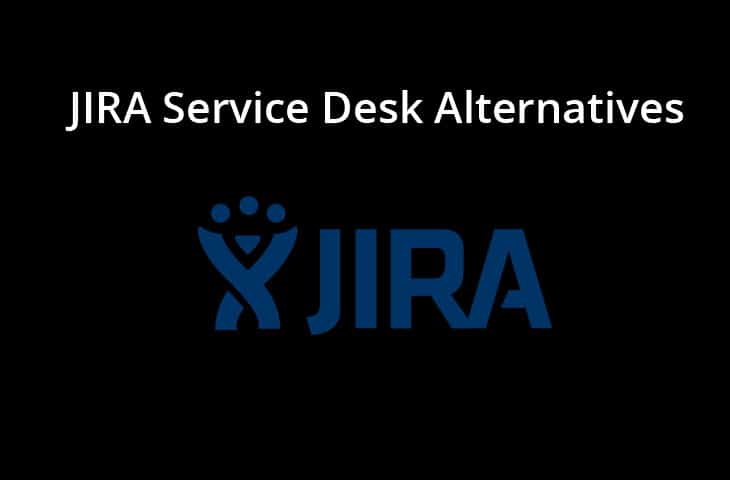
UPDATED: October 27, 2023
Jira Service Desk by Atlassian is a help desk request tracker and ticketing system. It is designed for teams that receive requests coming from other departments or customers.
The service helps these teams receive, manage, track, and resolve requests easier, from a central desk.
Here is our list of the ten best JIRA Service Desk alternatives:
- SolarWinds Service Desk – FREE TRIAL This on-premises package has a multi-tenanted option for MSPs and includes problem management through a Help Desk ticketing system and a self-service portal. Runs on Windows Server. Access a 30-day free trial.
- HaloITSM – FREE TRIAL An ITIL-based Service Desk package that provides task tracking and team management functions for a range of DevOps functions including IT support. Access this service for installation on Windows Server or as a SaaS platform. Access a 30-day free trial.
- NinjaOne – FREE TRIAL This remote monitoring and management system is built for use by managed service providers and it provides full IT asset management from a cloud platform. Access a 14-day free trial.
- ManageEngine ServiceDesk Plus – FREE TRIAL This IT asset management package provides a Help Desk function that provides ticketing and problem tracking. Access it as a Cloud service or install the software on Windows Server or Linux. Download a 30-day free trial.
- FreshService An ITIL-based package that provides change management, problem management, and incident management with a ticketing system for task scheduling. This is a SaaS platform.
- Zendesk A suite of cloud-based services that centers on a customer support platform with extensions into CRM and other business process suites.
- SysAid An ITIL-based Service Desk package that includes a Help Desk ticketing system and a self-service portal. This is a SaaS package.
- Zoho Desk A SaaS package that offers a core Help Desk ticket management system for phone, email, and chat support with a range of extensions, such as a chatbot.
- Spiceworks Help Desk A free, ad-supported, cloud-based Help Desk system with a self-service portal for users that includes a knowledgebase template.
- BMC Helix ITSM (Remedy) Designed to ITIL4, this SaaS package offers a high degree of automation for Service Desk teams with a chatbot and ticket routing that also accounts for phone and email support.
Jira’s Pros & Cons
Jira is an good product, and probably one of the more well-known at what it does when it comes to tracking requests and tickets.
The service request system is easy to use for those daily tasks. Users can submit tickets easily from many different channels.
Their tickets can be linked to other tickets, and even associated with large projects.
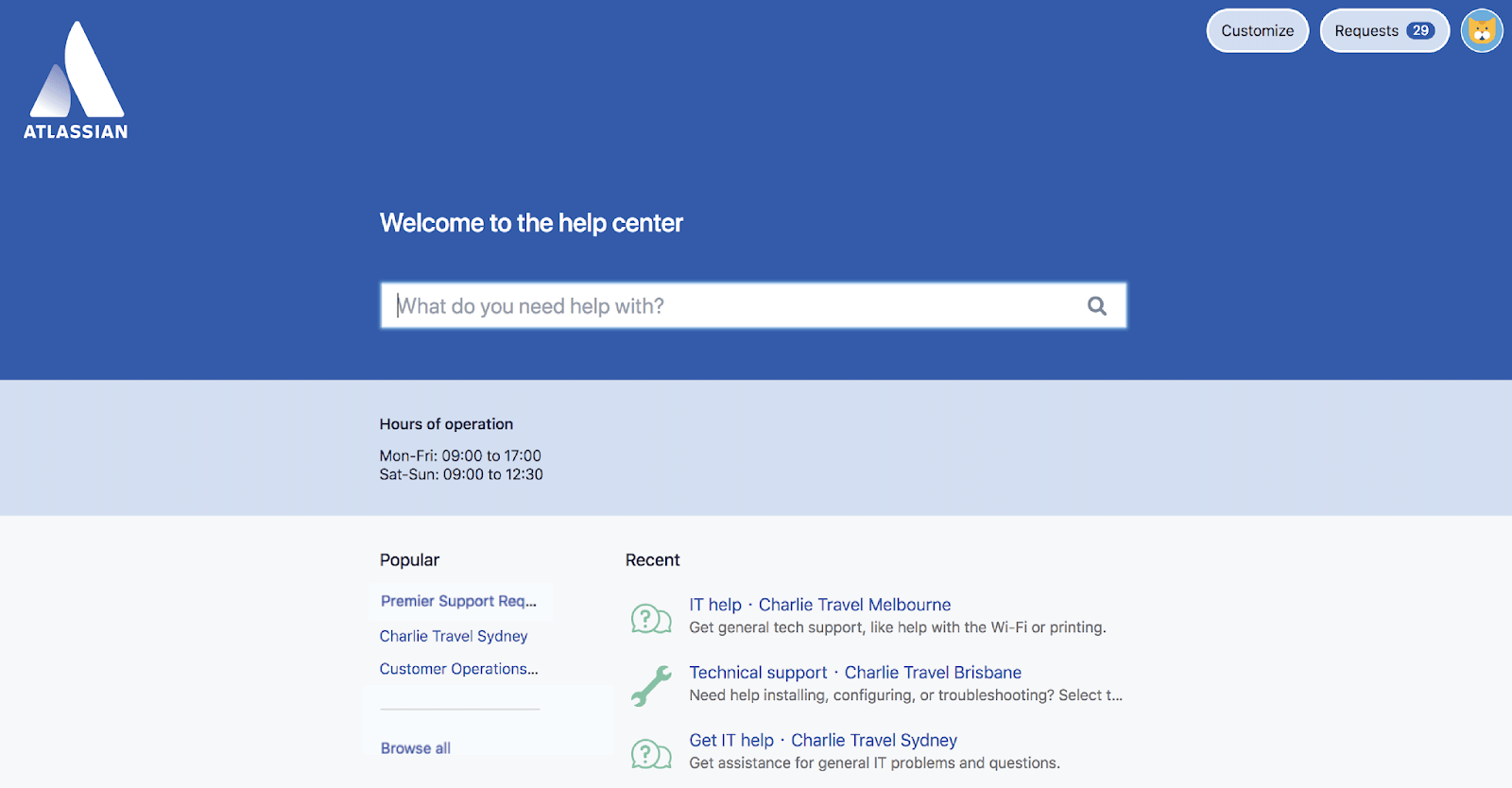
Pros:
- Easy issue tracking – Tracking problems easily and fast through tickets is probably the core of Jira.
- Great collaboration – The service allows multiple user collaboration on a single project. Jira also comes with extra communication tools, which enable users to forget about email.
- High customization – You can change the feel and look of the help desk center and portal.
- Amazing documentation and knowledge base – Jira Service Desk provides comprehensive documentation that guides users on how to set up and use the product and knowledge base with common problems.
Cons:
- Rigid email notification system – According to many users, Jira’s email notification system cannot be fully customized. Their email notification system can get cluttered. The notifications cannot be modified per user or sent by batch.
- Complex navigation and too many features – Another pattern seen from many Jira Service Desk users is that the learning for the portal and navigation can be complicated. The portal can be too sophisticated – It also comes with many features at once (some features are even useless), which can be overwhelming. There is a lack of an intuitive and easy to use dashboard.
- Difficult to set up – The administration and configuration of the entire solution can also get complex, especially for large environments. To configure and manage the platform requires some training. For example, the out-of-the-box fields and rules can be complicated to edit or remove.
- General complexity – The administration and configuration of the entire solution can also get complex, especially for large environments. To configure and manage the platform requires some training. For example, the out-of-the-box fields and rules can be complicated to edit or remove.
Jira Price and System Requirements
Jira offers very flexible and simple pricing including free trials for their different plans:
- Standard – $20/agent/month for up to 5000 agents
- Premium – $40/agent/month for up to 5000 agents licenses
- Freemium Version – $0 forever for up to 3 agents
Jira also offers a premium consulting service integration to the Service Desk.
It can be downloaded and deployed on-premises or as a cloud-based SaaS.
The software is supported by Windows, Linux, or macOS operating systems.
There is also a mobile application for Apple iOS and Android.
The best JIRA Service Desk Alternatives:
Jira is an great help desk product, but if you are looking for something that provides similar capabilities at a lower price or something easier to implement, keep reading.
What should you look for in Service Desk software?
We reviewed the market for Service Desk systems that compete with Jira and analyzed the options based on the following criteria:
- A package that implements ITIL standards
- Incident management and problem management features
- Task management through a ticketing system
- SLA tracking and resolution deadlines
- Team management features
- A free trial or a demo that provides a cost-free opportunity to test the package
- Value for money from a JIRA ServiceDesk alternative that is offered at a better price
With these selection criteria in mind, we looked for Service Desk and Help Desk systems that fully compete with JIRA Service Desk.
1. SolarWinds Service Desk – FREE TRIAL
SolarWinds Service Desk is one of the most comprehensive web-based ITSM and service desk solutions. It allows you to manage your IT assets, employee services, incidents, problems, and more. The Service Desk solution provides a way to manage, submit, and prioritize all tickets and requests from the single service portal. The service requests can come from multiple channels, which include email, phone calls, and even a self-service portal.
Key features:
- Service catalog
- IT asset management
- Integration with over +200 applications
- Reporting
The software follows ITIL best practices so that you can resolve IT incidents faster. It also comes with a complete knowledge-base, with a consolidated database of articles and solutions.
Pros:
- A simple layout makes management easy, even at scale
- On premise tool – good option for organizations who do not want a cloud solution
- Can track time entries, as well as SLA performance for helpdesk teams
- Proactive alerts can notify staff when SLAs are in danger of being breached
Cons:
- Can take time to fully explore the platform
SolarWinds Service Desk comes in three different editions:
- Team ($20.00)
- Business ($40.00)
- Professional ($70.00)
To get more information on prices, get a quote. Get a fully functional 30-day free trial of SolarWinds Service Desk.
2. HaloITSM – FREE TRIAL
HaloITSM is a Service Desk platform that was designed following ITIL guidelines. The modules in the HaloITSM package include Incident Management, Change Management, Problem Management, Configuration Management, Knowledge Management, and an ITIL service catalog.
Key Features:
- Incident Management
- Problem Management
- Change Management
- Service catalog
- SLA tracking
The package includes a self-service portal with a knowledge base template. The user portal provides an interface for the creation of support tickets and tracking of ticket progress. Tickets can be routed to the next available technician or forwarded to the Problem Management module for deeper issues. Tickets can be merged, rerouted, or escalated.
Task workflow monitoring is integrated with an SLA tracking system. Technician tools can include a remote control system, enabling the support operative to let the user see actions on the screen. A live chat utility is available as an add-on. The HaloITSM package is offered as a SaaS platform or as a download for Windows Server.
Prices start from £35 (~$40USD) to £65 (~$75USD) per agent per month (charged annually) depending on the number of licenses subscribed to. Access a 30-day free trial.
3. NinjaOne – FREE TRIAL
NinjaOne is a cloud-based SaaS platform of remote monitoring and management tools that can be used by managed services to look after the systems of their clients.
Key features:
- Automatic asset discovery
- Hardware and software asset inventories
- Ticketing system for user issues and service desk task management
- Patch management and remote access tools
The NinjaOne system provides a subaccount structure so an MSP sets up a separate account for each client. This keeps all of the asset information and activity logs for each customer business completely separate and guarded by different access credentials.
For each customer, the NinjaOne system scans the system, discovers all hardware, and draws up an inventory. The service then scans each endpoint and creates a software inventory. These information bases provide all of the material for Service Desk management.
The package includes a ticketing system that is fronted by a self-service portal for users. This portal can also host a knowledge base with advice for users. The knowledge base system can also be used to set up guides for technicians.
The ticketing system can also receive automated system monitoring alerts, so it creates a full technician team management package.
Pros:
- A multi-tenanted architecture for MSPs
- Automatic IT asset inventory management
- Constant system monitoring with alerts for discovered problems
Cons:
- No on-premises version
You can find out more about pricing by registering for a free trial and receiving a custom quote. You can assess the NinjaOne system with a 14-day free trial.
4. ManageEngine ServiceDesk Plus – FREE TRIAL
ManageEngine ServiceDesk Plus is an IT help desk software that helps deliver excellent customer service. The software provides central control and visibility of all the IT issues and tickets. You can manage and track all the problems throughout the entire lifecycle. With ManageEngine ServiceDesk Plus, you can to categorize, analyze, and close problems. These actions allow you to record the root cause and improve response times for later incidents.
Key features:
- Service catalog
- CMDB (Change Management DB)
- IT Project Management
- Integrations with third-party software
- Comprehensive reports.
End-users can submit tickets from multiple channels, like email, phone, self-serving portal. The tool automatically creates the tickets and assigns them to a technician (or group) based on expertise. The service does not only help you resolve tickets, but you can also manage IT projects, manage change and configuration, manage assets, and more. The tool can be deployed on-premises or in the cloud.
Pros:
- Robust all in one tool for managing client contracts, maintenance requests, and other ancillary services MSPs normally offer
- Automatic asset discovery helps keep NOC teams informed of scope and new devices that are added to the network
- Cross-platform support work with Windows or Linux server distros
- Available for on premise deployment as well as a SaaS
Cons:
- ManageEngine offers a range of services and products that can take time to fully explore and utilize
ManageEngine ServiceDesk Plus comes in three editions: Standard, Professional & Enterprise. Sign up to the 30-day free trial of ServiceDesk Plus in the cloud or on-premises.
5. FreshService
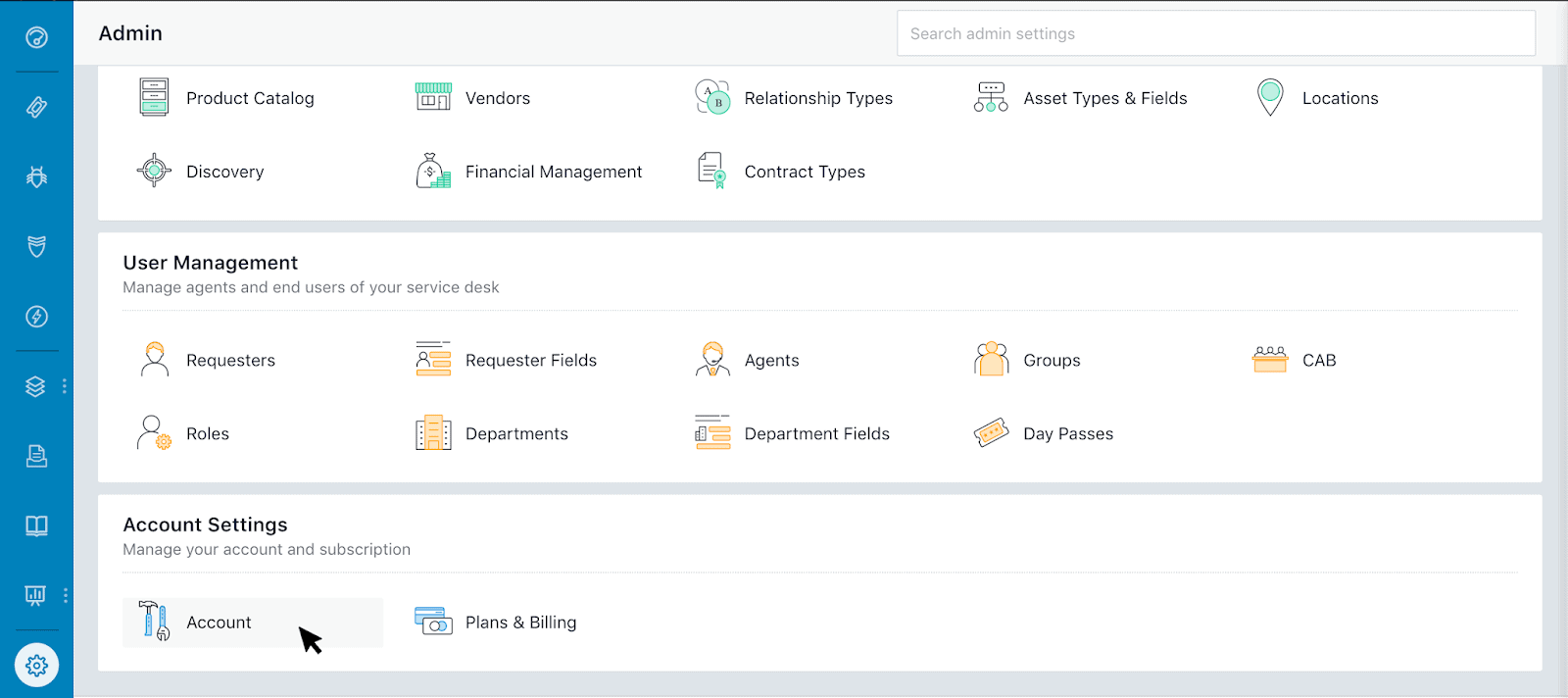
FreshService is a cloud-based ITSM software for the service desk. Its help desk and service management are specially designed for IT operations. The tool can also be integrated with third-party apps like Jira, GSuite, Zapier, Dropbox, AWS, and more, to allow easier service management. With Freshservice, you can automate tasks and internal processes with the Workflow Automator.
Key features:
- Incident management
- Asset management
- Release management
- Service catalog
You can automate daily tasks such as ticket assignment, followup approvals, and more. Freshservice allows tickets from multiple channels, such as via email, a self-service portal, chat, or phone. Freshservice's user interface is intuitive and requires little training. It is highly customizable and can also be configured for non-IT requirements. Freshservice offers support via email and phone.
Pros:
- One of the better user interfaces for ITSM tools
- Flexible subscription and annual pricing options
- Includes a self-service portal to help reduce inbound tickets
- Simple ticket creation is user friendly for new staff
Cons:
- The trial could be a bit longer
- Integrations into other ITSM tools can be complicated
Freshservice is available on an annual or monthly subscription basis. Their product is available at four editions:
- Blossom ($29 /agent/month)
- Garden ($58 /agent/month)
- Estate($87 /agent/month)
- Forest ($85 /agent/month) – billed yearly.
Freshservice offers a 21-day free trial when you sign up.
6. Zendesk
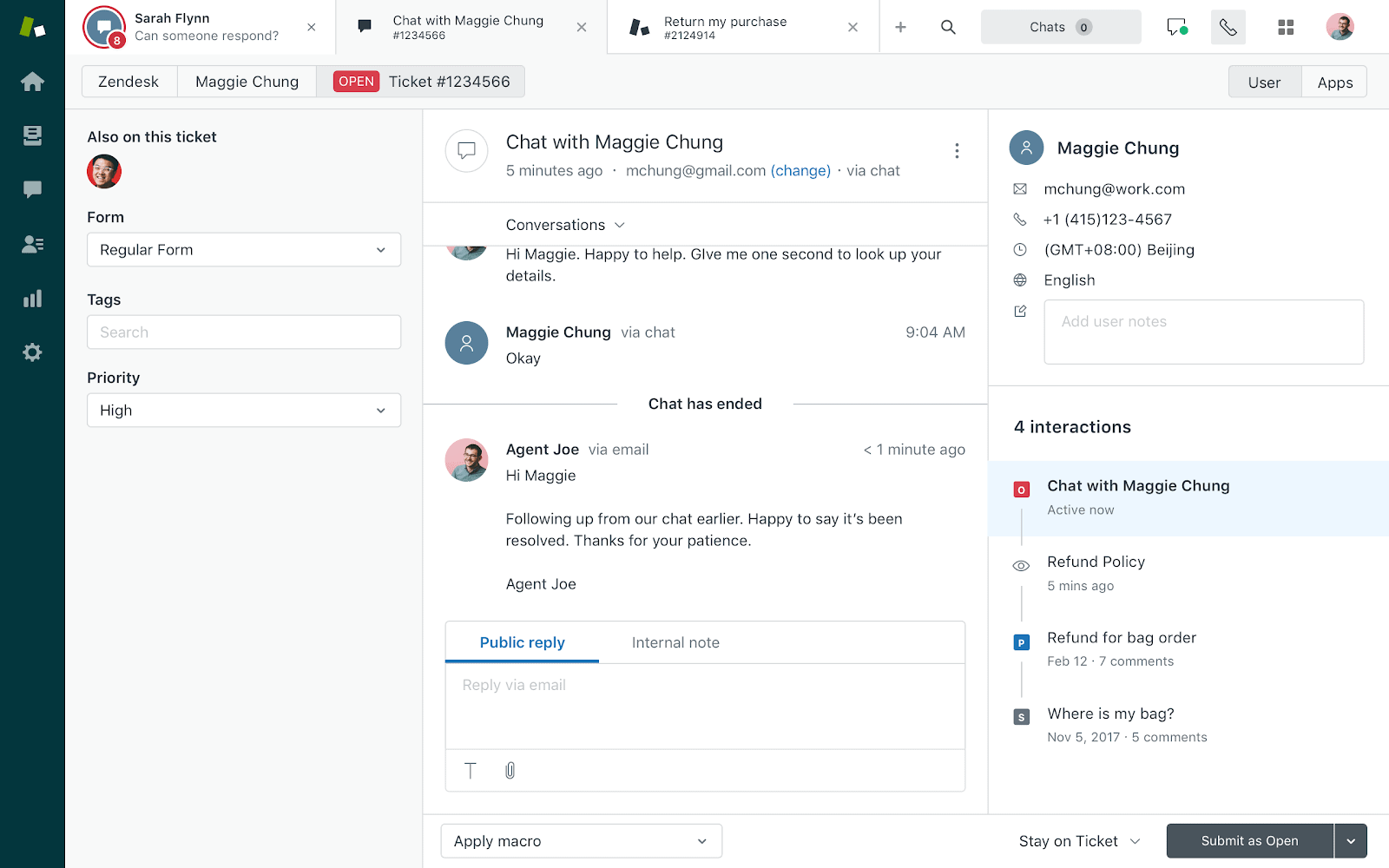
Zendesk is a customer support ticket system. The Zendesk Support and element of the Zendesk Suite is an easy-to-use system for tracking, prioritizing, and resolving support tickets. Zendesk is very flexible and great for any size of business.
It comes as a suite of various customer service and engagement products.
Key features:
- Flexible ticketing system with automated workflow
- Mobile support for iPad, iPhone, and Android Apps
- More than 100 out-of-the-box integrations with third-party apps
- Advanced reporting and analytics
You can start from one agent and support, or get a bundle of tools with more agents, or even choose from single tools, such as Guide, Chat, Talk, Sell, Explore, Gather, and Connect.
The software integrates all ticket source channels, like email, phone, messenger, chat, into a single omnichannel solution.
Pros:
- Simple and intuitive interface
- Centralized ticketing management and chat helps consolidate team-based tools
- The knowledgebase is easy to setup and helps reduce new tickets
Cons:
- Interface could use simplified and easier to use
Zendesk has a highly flexible pricing plan. There are various plans for Zendesk Support, starting from:
- Essential ($5 per agent/month)
- Support ($19 per agent/month)
- Professional ($49 per agent/month)
- Enterprise($99 per agent/month)
- Elite($199 per agent/month)
Start a ZenDesk free trial for a limited time by registering to ZenDesk official site.
7. SysAid
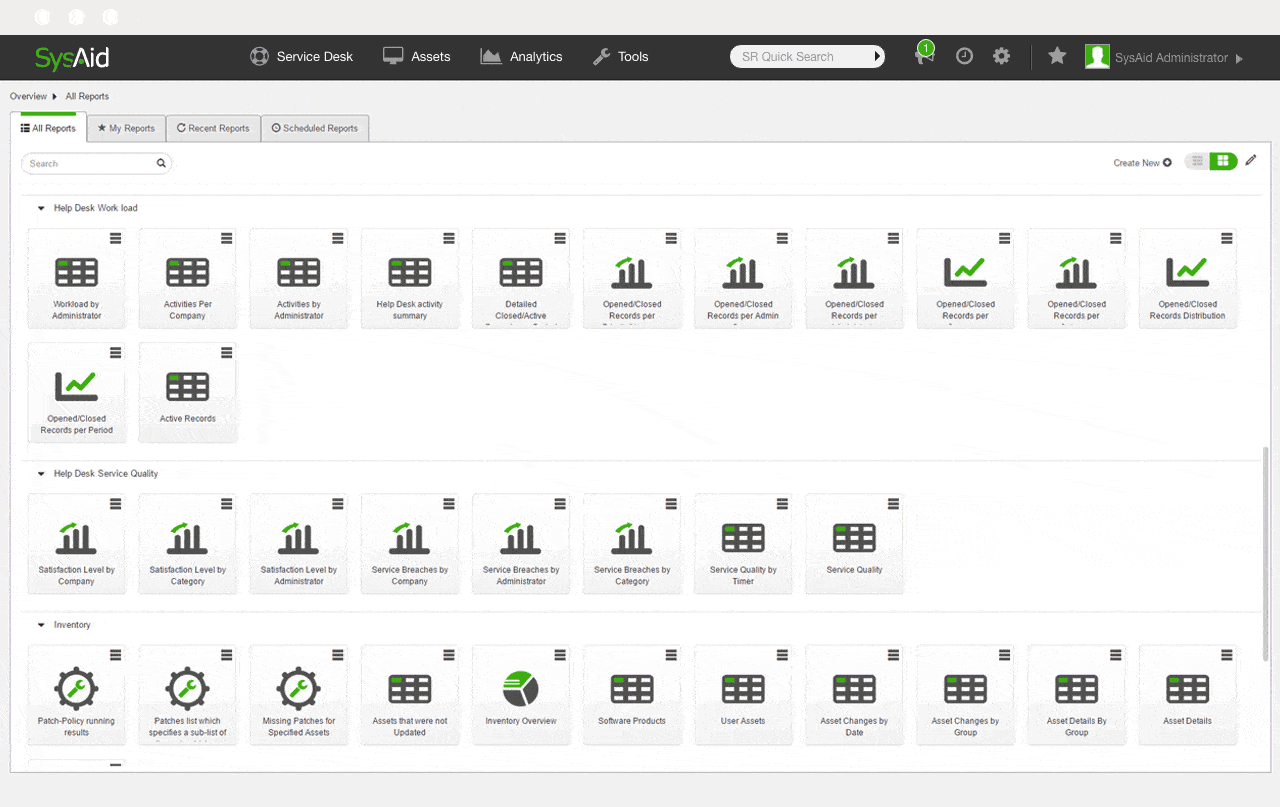
SysAid provides cloud-based ITSM, help desk, and service desk software. Its ITSM solution provides the ITIL (Information Technology Infrastructure Library) best practices.
Key features:
- Self-service portal
- Comprehensive knowledge base
- Password Reset
- Remote Control
You can integrate this ITSM with other tools like the Help Desk and the Asset Management into a single platform. The SysAid Help Desk software includes essential features such as a comprehensive ticket management system, IT asset management, self-service portal, mobile device management, chat, and more.
The IT ticket management system helps you track all issues throughout their life-cycle, from the first contact to resolve. The ticketing system includes incident management that enables you to log, process, manage, and report on issues.
Pros:
- Offers SNMP monitoring through a simple plugin
- Flexible pricing options allow you to choose the features you pay for
- Good option for those looking for SNMP monitoring and patching solution
Cons:
- Lacks enterprise features – better suited for small to medium size networks
SysAid comes in three different editions:
- Basic (Help Desk, Ticketing, and Asset Management)
- Full (ITSM)
- A-La-Carte (features priced separately)
For more information, get a quote. Get a 30-days Help Desk free trial.
7. Zoho Desk
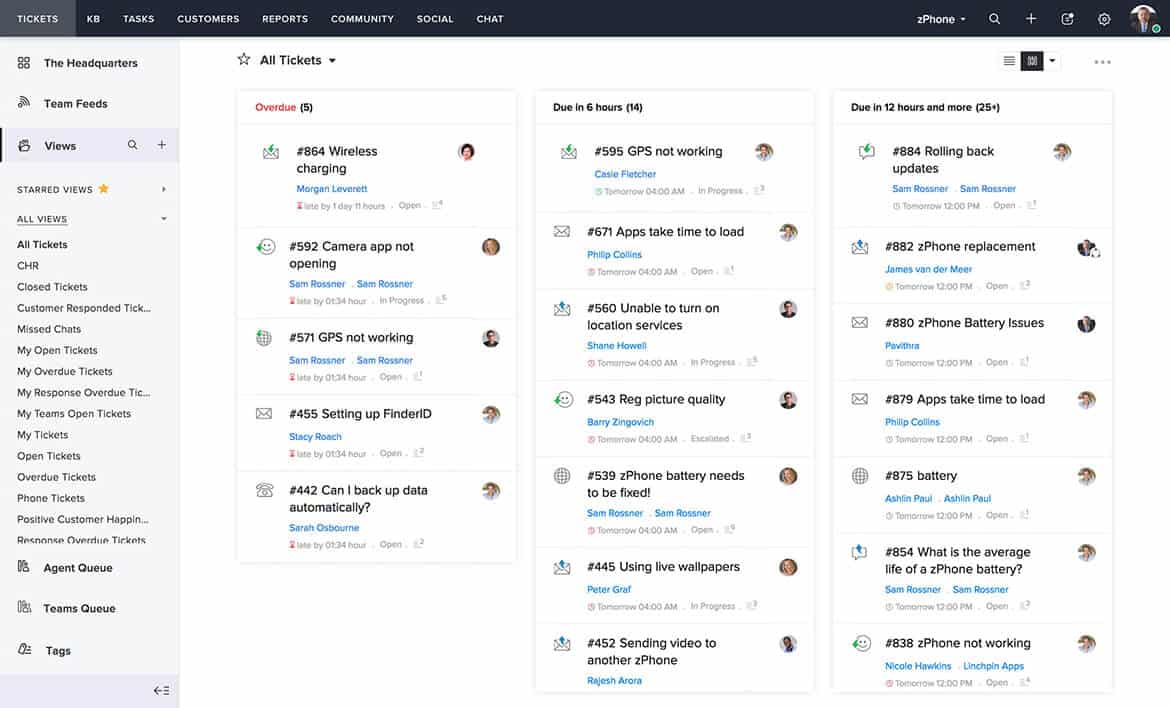
Zoho Desk is a web-based context-aware help desk software. It allows you to manage all customer support tasks from a single place. With it, you can assign, track, resolve and create alerts for tickets created by your customers, agents, or managers. The software comes with “Work Modes” that improve agent productivity.
Key features:
- Multichannel: phone, chat, social media, and more
- AI assistant. Zia voice, dashboard, notifications, and more
- Self-service portal
- Automatic ticket assignments
- Integration and collaboration with third-party software
It automatically organizes all the generated tickets according to due time, customer type, and more. This categorization allows for easy ticket management and prioritization. The tool also introduces AI, process-management, and a marketplace to improve customer service.
The new Zia is an assistant that leverages AI to enhance the efficiency of customer service teams.
Pros:
- Cloud-based installation makes deployment simple with no need for on-premise onboarding
- Is a white-labeled product, ideal for MSPs
- Features automation tools that empower technicians to script solutions
- Can execute commands prior to remotely connecting
- Offers mobile report support for both iOS and Android
Cons:
- More suited for MSPs, and not smaller LAN networks
- Would like to see a longer trial period
Zoho comes in four different editions:
- Free ($0 for up to three agents)
- Standard ($12/agent/month)
- Profesional ($20/agent/month)
- Enterprise ($35/agent/month)
All prices are based on a yearly plan. Sign up to get the three agents for the Free plan.
8. Spiceworks Help Desk
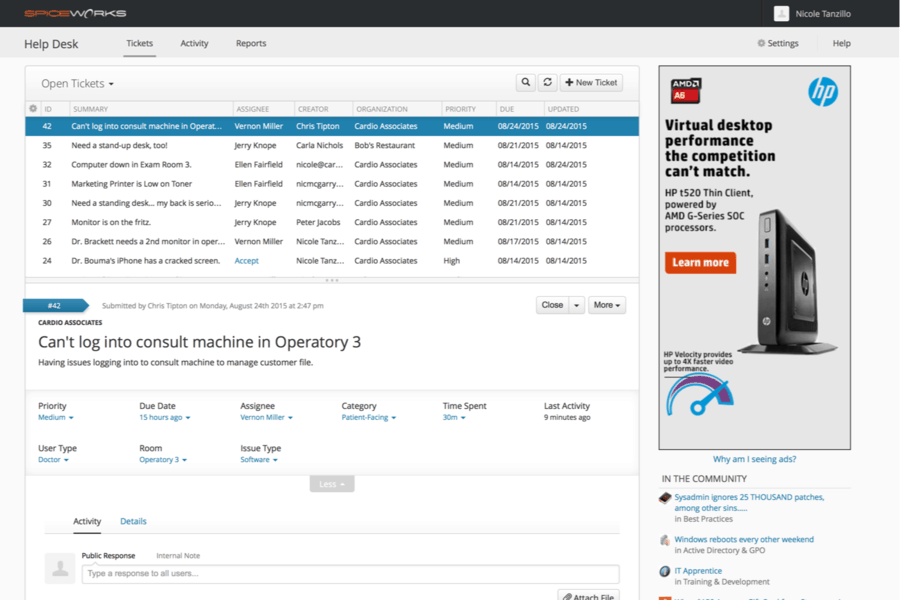
Spiceworks Help Desk is free cloud-based software that offers IT ticket management. The software comes with ticket monitors, alerts, custom ticket attributes, and rules. You can also get reports with critical information such as ticket updates and their priority. Employees or customers can submit tickets via different channels such as email or the self-service user portal.
Key features:
- Spiceworks Help Desk Mobile App
- Multi-chanel. Self-service portal or email
- Comprehensive knowledge base
- Auto-assign help tickets
When users submit their tickets to the portal, they can manage them, and even see their progress. The portal can integrate with the Active Directory for easier authentication. The Spiceworks Help Desk can also be installed on your mobile. You can get updates on tickets and configure push notifications on your mobile phone.
Pros:
- Completely free cloud-based helpdesk tool
- Great functionality through the Spiceworks Help Desk Mobile App
- Offers on-premise options as well as a SaaS version
Cons:
- The desktop version isn’t supported as much as the cloud-version
It's 100% Free. It is supported by ads. Sign in to get free access.
9. BMC Helix ITSM (Remedy)
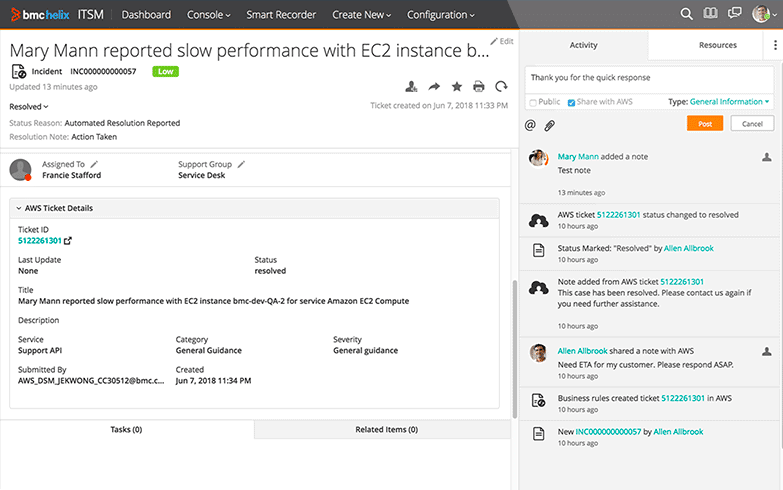
BMC Helix ITSM (or next-gen Remedy) is a cognitive automation software for IT service management. It can be deployed on-premises, in any private or public cloud or hybrid environments. BMC Helix is available for multi-channels. Users can interact with the system through email, mobile, and social media. The solution is cognitive. It can perform proactive and predictive tasks, such as automation of repetitive functions, auto-classification and routing, automatic assignment according to expertise, and more.
Key features:
- Optimized for ITIL4
- Rich reports and visualizations
- Multi-cloud and multi-device (IoT)
- Cognitive automation capabilities
- Chatbot and virtual agents
It also provides virtual agents and chatbots to work on level one tickets. BMC Helix also provides the chatbot, which is more than a simple knowledge base. This chatbot lets BMC users interact with a bot and get information from articles and tutorials much faster.
Pros:
- Simple yet intuitive interface
- Can automated security tasks such as vulnerability scans, and automated network probes
- Can automate configuration restoration
- Can support multi-cloud and hybrid cloud environments
Cons:
- Better suited for larger networks, especially those with in-house remediation teams
Sign up to start a BMC Helix free trial.
Conclusion
Jira is one of the most popular services and help-desk solutions out there. Its ticketing system is very effective, responsive, and it comes with many features.
But according to many users, the software can be challenging to learn and implement. Fortunately, there are some fantastic Jira Alternatives and Replacements out there that we've outlined above.
If you are looking for something more flexible and straightforward, grab one of the tools from above and get going! Many of them have free Trials for 30 Days to get you started immediately!
Some of the tools shown here are easier and don't need much management. They can be installed on-premises or even use them from the cloud, depending on your preferences!
A couple of them are 100% free, and others allow a couple of agents for free— which is a great option to test the waters.
Comprehensive tools like SolarWinds Service Desk, ManageEngine ServiceDesk Plus and Zoho Desk have similar capabilities as Jira, and the best thing is that they all allow free trials! Good Luck!
JIRA Service Desk Alternatives FAQs
What are the key features of JIRA Service Desk?
The key features of JIRA Service Desk include request management, incident management, problem management, SLA management, knowledge management, and reporting.
What are the reporting capabilities of JIRA Service Desk?
JIRA Service Desk provides a range of reporting capabilities, including the ability to generate reports on request, incident, and problem volume, SLA performance, and knowledge management. Additionally, JIRA Service Desk provides real-time dashboards and visualizations to help IT and support teams track key performance indicators.
How does JIRA Service Desk integrate with other JIRA products?
JIRA Service Desk integrates with other JIRA products, including JIRA Core and JIRA Software, providing a centralized platform for managing IT and support processes, as well as software development processes.
How do I customize JIRA Service Desk for my organization?
To customize JIRA Service Desk for your organization, you can use the JIRA Service Desk administration console to configure workflows, SLAs, and other settings to meet your specific needs.

